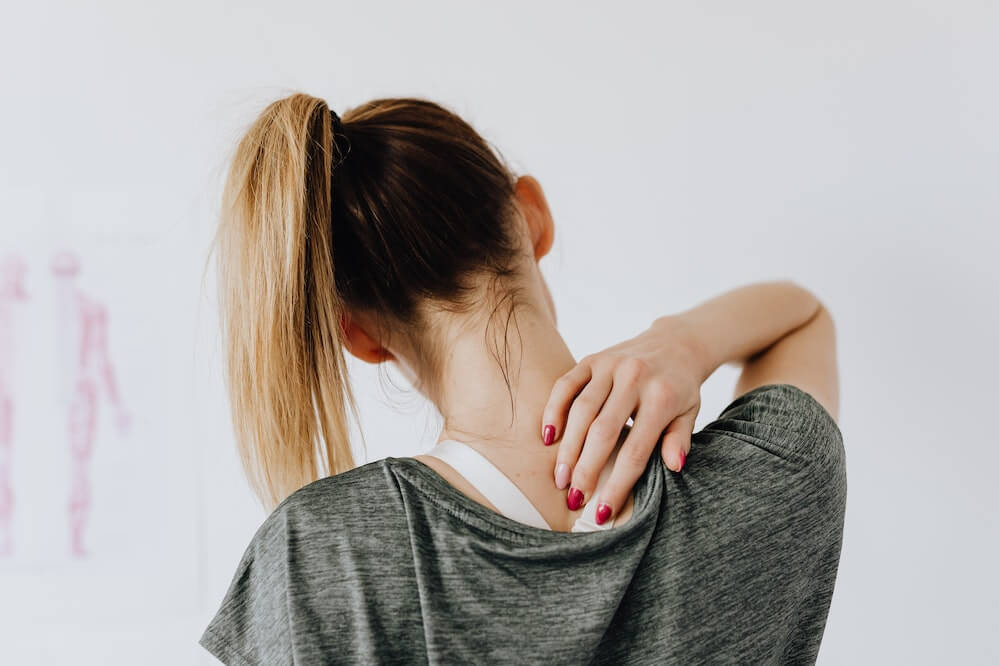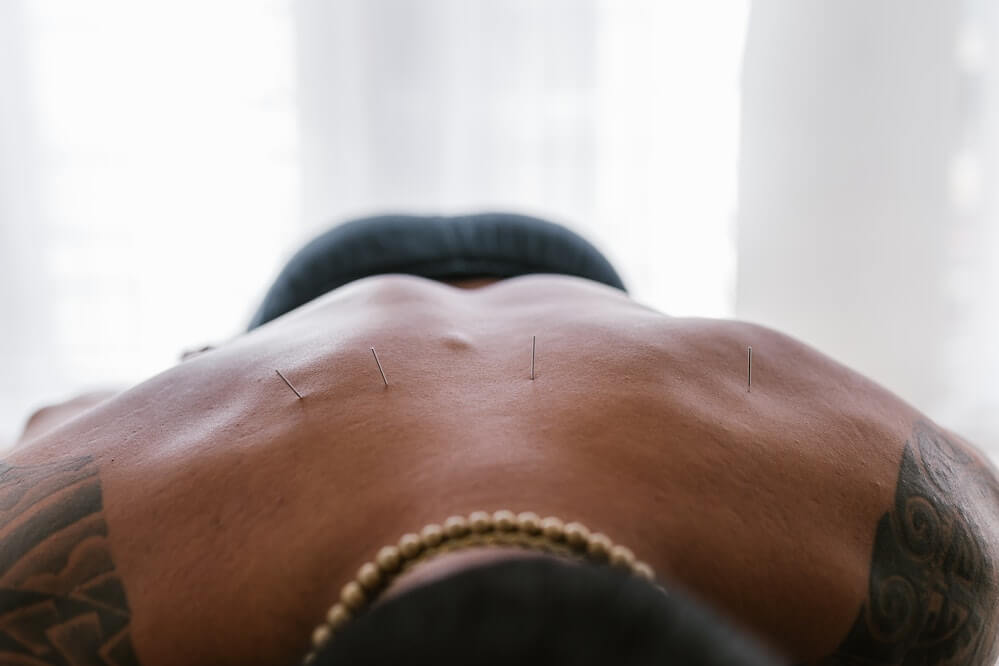Are persistent muscle knots causing you discomfort and affecting your daily life? Instead of reaching for painkillers, consider the ancient art of acupuncture for natural pain relief. Join us as we give insight into acupuncture for muscle knots: how it can effectively target those pesky muscle knots with its virtually painless needles. Furthermore, you will learn how acupuncture relieves muscle tightness and helps prevent muscle knots from recurring.
What Are Muscle Knots?

Muscle knots are hyperirritable spots in the muscle or fascia tissue, also known as myofascial trigger points. Our muscles are made of layers of fibers that run in opposite directions from those above or below. Overuse, frequent dehydration, or an injury can cause layers to stick together and inhibit the normal movement and function of the muscle. Upon touch, it can feel like swollen or tense hard lumps in the muscle.
There are two types of trigger points pain:
1.Active: They can produce spontaneous, intense pain in the body.
2Latent: They only produce pain, tenderness, or dull aching when pressed.
They can develop anywhere in the body where there is muscle or fascia, but some common areas are the neck and shoulders, lower back, IT band area, calves, and shins.
What causes them?
Muscle knots can be caused by:
— Muscle overuse or strain
— Poor posture
— Muscle injury
— Musculoskeletal imbalances
— Dehydration and poor nutrition
— Lack of stretching and exercise
— Medical conditions like fibromyalgia and myofascial pain syndrome.
You can tell if you’ve developed muscle knots if you experience the following symptoms:
— Localized pain or discomfort in a specific area of a muscle
— Noticeable palpable lump or nodule when you press on the affected muscle
— Reduced range of motion and stiffness or difficulty in certain movements
— Referral pain like headaches, toothaches, or earaches
— Muscle twitching or spasms.
How Does Acupuncture for Muscle Knots Work?

With more than two millennia in history, acupuncture has shown persistence in conserving Traditional Chinese Medicine (TCM) principles and benefiting hundreds of generations. This practice involves inserting thin, metallic needles into specific acupuncture points in the body to release pain and promote the body’s natural healing process. According to TCM, the key to good health is the flow of blood and energy (Qi). Any stagnations or blockages in the flow can cause various ailments and painful conditions. Therefore, muscle knots are caused by stagnation in the area where the flow has been hampered. This is due to the adhesion blocking the movements of the muscle and the nutrients and blood entering the muscle and surrounding tissue.
In TCM, muscle knots are also known as “Ah Shi points,” meaning they are acupuncture points located primarily by palpation. A common practice is inserting needles in these points to loosen the knot and relieve pain.
Another technique for resolving muscle knots, known as “Stuck Needle,” which involves inserting the needle at the knot and gently turning the needle to affect the muscle fibers, can help reduce the knot size and relieve pain.
Acupuncture for muscle knots can be helpful as it:
— Relaxes muscles and reduces muscle tension and inflammation by stimulating blood circulation.
— Releases endorphins, the body’s natural painkillers, leading to pain relief and a sense of relaxation.
How Many Acupuncture Sessions Are Needed to Resolve a Muscle Knot?
The number of acupuncture sessions required to resolve muscle knots depends on factors like the severity of the knots, how long you’ve had the knots, your overall health, and how your body responds to acupuncture. For example, mild muscle knots can be treated in one or two sessions, whereas severe muscle knots can take several sessions in the span of weeks or months to resolve. The number of sessions needed can also be influenced by delayed treatment, as it can take extra sessions to release tension fully.
Can Acupuncture Help Prevent Muscle Knots?

As acupuncture is based on TCM principles, which take a holistic approach to treatment, acupuncturists not only treat the symptoms of the conditions but also try to find the underlying causes and how to prevent them.
As the key to preventing muscle knots is promoting healthy muscle function, acupuncture can contribute to preventing muscle knots by:
— Helping relax muscles and promoting better blood circulation reduces the chances of muscle tension and the formation of knots.
— Having a calming effect and reducing stress, eliminating stress-related muscle tension.
— Improving posture in conjunction with other exercises reduces the strain on muscles.
— Incorporating periodic sessions as part of the self-care routine to maintain muscle health and prevent the recurrence of knots.
Bottom Line
Acupuncture offers a compelling natural solution for the relief of muscle knots. By targeting these trigger points with precision, it not only addresses the symptoms but also the root causes of discomfort. Its ability to enhance circulation, reduce stress, and promote relaxation makes it a holistic approach to overall well-being.
So, if you’ve been enduring the pain of muscle knots, consider acupuncture as your pathway to a healthier life. Embrace this ancient practice and experience the transformative benefits of natural pain relief and relaxation.
You can check out our Holistic Wellness Center based in Columbus, OH, and seize the opportunity of receiving a treatment tailored just for you!
Frequently Asked Questions (FAQs)
Are muscle knots and trigger points the same thing?
Although they’re related, muscle knots and trigger points aren’t the same things. Muscle knots are localized, whereas trigger points can cause pain in more than one body area.
Can dry needling get rid of muscle knots?
Yes, dry needling can be an effective treatment for releasing muscle knots, allowing them to contract and relax normally, thus reducing pain and improving range of motion.
How do doctors treat muscle knots?
Depending on the severity of the knots, underlying causes, and the patient’s condition, doctors may try various treatments such as physical therapy, massage therapy, dry needling, cold laser, electrical stimulation, pulsed ultrasound, etc.
Is acupuncture painful for treating muscle knots?
Generally, acupuncture is painless or low-pain, with most people experiencing minimal discomfort during the procedure. After the needles are inserted, the acupuncturist may manipulate them to achieve the “Deqi” sensation, described as a dull ache, tingling, or warmth around the needles. Although it’s unusual, it’s generally not described as painful.
Are there any side effects or risks associated with acupuncture for muscle knots?
Acupuncture is considered a safe treatment. However, each individual responds to it differently, so it has potential side effects and risks, although they’re usually mild and uncommon. Some possible side effects are dizziness, drowsiness, soreness, minor bleeding or bruising where the needles enter the skin, nausea, etc. Acupuncture contradictions include pregnancy, patients with epilepsy and hemophilia or other clotting disorders, metallic allergies, pacemakers, and more.